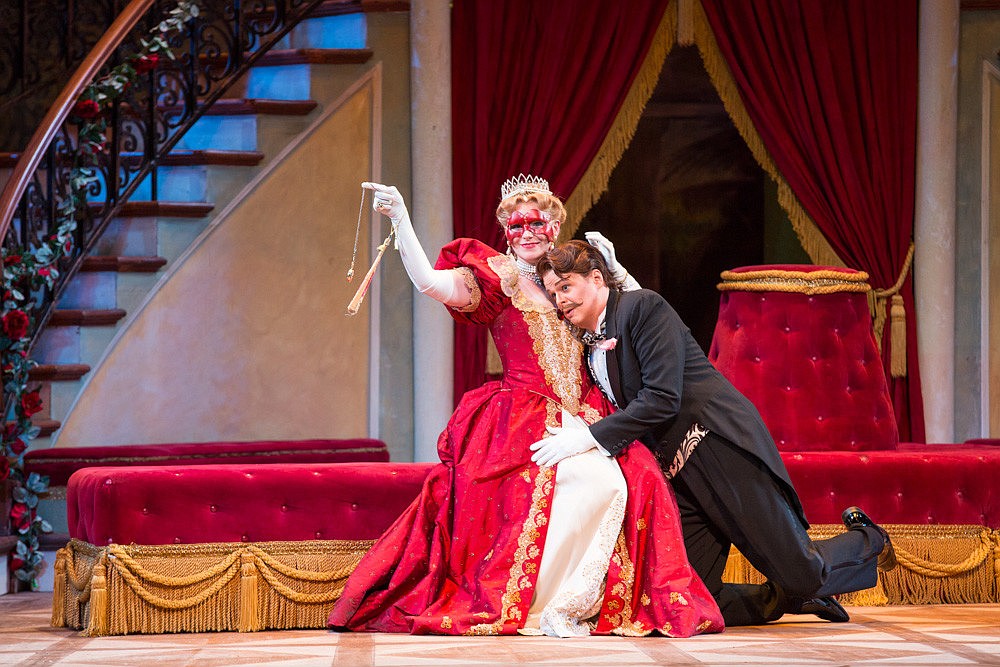- April 25, 2024
-
-
Loading

Loading

When describing operettas, Victor Borge said, “Operettas are just like operas, only not so much. Sometimes they are called light operas, because they’re shorter and the prima donnas weigh less.” He went on to tell us, “Half the time you’re not sure whether you’re supposed to laugh or cry until it’s too late. The way to tell is to look at the stage just before the curtain falls. If anybody’s left standing, it was a comedy.”
“Die Fledermaus,” by Johann Strauss, Jr., leaves no doubt in our minds and, in the current production at Sarasota Opera, it’s hilarious. This comedy, based on two sources, Das Gefängnis (The Prison), by German playwright Julius Roderich Benedix, and a French vaudeville play, Le réveillon, by Henri Meilhac and Ludovic Halévy, was adapted by Richard Genée after a translation back into German by Carl Haffner. Popular since its premiere in 1874, it’s become an operatic comedic staple in houses around the world with productions ranging from the more sedate to the purely slapstick. One way or another, it’s the music and singing that win our hearts and transport us to a time when revenge was funny, friendships were paramount and paramours were assumed.
The plot is based, loosely, around a trick that was played on Dr. Falke, a friend of Gabriel Von Eisenstein. It seems the two had been at a costume party and Eisenstein left his inebriated doctor friend to sleep the night away on a park bench, only to have to walk home, publicly, through the streets the next morning still dressed as a bat (aka Fledermaus). Although this happened a few years before our opera begins, Falke has been seeking revenge ever since and we are, in the three acts of operatic twists, turns, deceptions and duplicities, treated to his good-humored plan to get even with his friend.
Eisenstein, sung with tremendous skill and appeal by Sean Anderson, is by far the star of this production. We’ve heard him in roles as varied as George in “Of Mice and Men,” John Proctor in “The Crucible” and Papageno in “The Magic Flute,” and he’s always made an excellent impression. But his performance in “Die Fledermaus” was the best, yet. Originally conceived for a tenor but generally performed by a baritone, Anderson’s upper range has come into full bloom, ringing like a tenor with baritone heft. He pretty much owned the evening.
Matthew Hanscom’s Falke, on the other hand, was rather weak. It’s the good doctor who really runs the show by maneuvering the others like a puppet-master, but Hanscom comes off in this production as a somewhat secondary character, without the necessary cleverness in his portrayal or the important vocal strength needed to put him in the spotlight.
Rosalinda, Eisenstein’s beautiful but devious wife, was portrayed by Danielle Walker with a shimmering voice that easily surmounted the enormous range Strauss wrote into her part. Angela Mortellano as Adele, her maid, had just the right “bow-on-the-backside soubrette” insouciance and flexibility in her voice to carry off her part while singing. In fact, her Laughing Song was so well sung, it sent the audience into spontaneous paroxysms of laughter the way a giggling baby brings instinctive joy to any adult in range. But both women, when giving their lines as speakers, were much too coarse for my taste. Perhaps it was the marked difference between their beautiful singing diction and their obviously regional American speaking accents, but someone needs to train singers to speak as well as they sing when the score calls for dialogue.
Much more attuned to acting, speaking and singing was Blythe Gaissert as the eccentric young Prince Orlovsky. Gaissert, whom we heard recently in a chamber concert with members of the Sarasota Orchestra, seems made for this trouser role, singing it with a full, rich mezzo and inhabiting her bored, boyishness with charm and finesse. And Joshua Kohl as Alfred, Rosalinda’s paramour, has a clarion tenor that would make anyone swoon with passion.
Steven Condy’s Frank, the prison warden who arrests the wrong man but keeps his good humor, has the vocal power and acting presence to convince us of nearly everything he does. Constandinos Tsourakis is a convincingly drunken Frosh, the jailer, and Briana Elyse Hunter as Ida, Adele’s sister, and Gage Herrmann, as the lawyer, Dr. Blind, handle their roles well.
This is an enjoyable, fresh Fledermaus with beautiful costumes by Howard Tsvi Kaplan, well-designed scenery by David P. Gordon and excellent lighting effects by Ken Yunker. I’d have preferred a different English translation to the one offered by Marcie Stapp which, at best, I found corny and, at worst, befuddling. Why, for example, would a Russian prince offer anyone Madeira wine instead of the vodka he calls mother’s milk?
The excellent instrumental ensemble under Victor DeRenzi’s direction was the Sarasota Orchestra, proving their dexterity and versatility from stage to pit. DeRenzi held all his forces together with strength and musicality but there were moments when this charming Viennese operetta became an equally charming Italian opera buffa.
Stephanie Sundine’s staging was both stylish and clever, incorporating broad comedy with intelligent movement that always held our attention. The fun addition of a bit of Beethoven brought a surprise delight to the third act’s prison scene, adding a nice twist to an already twisty story.
A friend summed up the evening in an email I received the morning after. She wrote, “We loved the orchestra, the singing, the staging, the colorful clothes; it was fun and no one died. A wonderful way to spend an evening.”